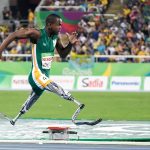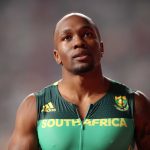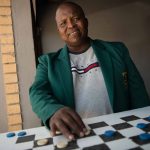Anrune Weyers fights for para-athlete recognition
The South African sprinter wants to raise the profile of para-athletes in the country to increase understanding of what they do and boost the sponsorship of under-funded athletes.
Author:
3 February 2020

Outside of the few sunny, glorious days of the Paralympic Games and the World Para Athletics championships, South Africa’s disabled athletes are barely noticed.
The few such athletes who have climbed previously impossible heights and raised the national flag on the global stage have entered their names into sporting folklore but not necessarily the hearts of ordinary South Africans and the minds of influential sponsors. It’s an injustice that reflects the many obstacles placed in the way of most disabled people in South Africa.
Winning world titles and breaking records is meant to change fortunes and open doors, but it does no such thing for disabled athletes.
Related article:
When Anrune Weyers returned from the World Para Athletics Championships in Dubai with gold, silver and bronze for the 400m, 200m and 100m respectively in the T47 category for athletes whose primary impairments are in the upper limbs, there were no riches thrown at her fast feet, no throngs of frenzied fans lining the streets. And though money is no motivation for athletes like Weyers, she still shivers from the cold shoulder para-athletes are given by sponsors and administrators.
“We have a big struggle in terms of support for para-athletes. When I came back from the world champs in Dubai, the question was asked quite a lot. And I’ll be honest, we’re not all equal in this country and that’s sad, because we’re raising South Africa’s flag high and we’re making the country proud,” says Weyers.
The 27-year-old Stellenbosch resident was born with a congenital defect in her left arm and turned to athletics as a way to fight her own insecurities growing up in a world where “imperfections” are frowned upon.
“Growing up with a disability, it was a little difficult to know my place in the world. That was a big challenge for me. I’m a female, and in the world we live in we’re always looking for this perfect idea of how someone must look, and I struggle with that image that the world created,” she says.
Not being defined by labels
Weyers’ passion for athletics was spotted early. The sport changed the trajectory of her life and she is fully appreciative of that fact.
“In primary school, I had a really great teacher. She inspired me to show people that there’s more than just a box that people put us in, and we’re all accepted the way we are. That placed faith and hope in my heart on the day I heard it from her. Athletics gave me confidence. Every time I did it, I felt as if I’m turning into someone I want to be. And obviously I was good at it and that helped me say, ‘You know what, I’m different. I need to accept it and I need to live it and I need to use the gift that God has given me – and that’s to run.’ That’s where it all started.”
South Africa’s disability prevalence is at 7.5% of the population. The national disability grant ranges between R1 695 and R1 780 a month. Disabilities are more prevalent in females than males (8.3% and 6.5%). Besides pursuing personal milestones, the added expectations thrust upon para-athletes means they become the voice of disabled people by default. It’s a responsibility Weyers doesn’t take lightly.
Related article:
“With all the challenges we face, we’re giving people in South Africa and all around the world hope that despite your disability, despite your upbringing, everything that’s difficult in your life, you can always shine,” she says. “I really hope that leading up to [Tokyo] 2020, people will invest in them as para-athletes. Not just the performance, but in their stories, too.”
Weyers’ story revolves around her faith and compassion. She teaches at an additional needs school and is deeply religious. She’s called on her faith in times of self-doubt and difficulty. “There’s a quote that says ‘difficult roads often lead to beautiful destinations’. For me, it all started when I loved myself. I’m aware of the fact that God made me without a hand, with freckles and all, but I’ve shown the world you can also be loved just the way you are. So it all starts with yourself and making sure you’re happy with who you are and what you want in life, and the world will see you with a different view,” Weyers says.
Building on a successful 2019
Under the tutelage of renowned Paralympic coach Suzanne Ferreira, Weyers is eyeing a repeat of her Dubai bonanza if she competes in the Paralympics. For the sprinter, 2019 was a monumental year and success in Tokyo will cement her place among the pantheon of legendary South African para-athletes such as Natalie du Toit, Hilton Langenhoven and Ernst van Dyk.
“I literally get goosebumps. If I sum up 2019, it was definitely a magical year for me on the track as well as a person. I’ve grown so much. Obviously, I’ve done quite a lot on the track that I’m proud of. It makes me excited about what my body can do,” Weyers says.
“I’m excited to go again. My goal for 2019 and 2020 was to go for the world record and I achieved that, and I obviously want to improve on that and still put on new goals for myself. We’ve been back on the track since 6 January. We’ve started building up in the gym and the track, and I’m excited to be stepping up a notch as well this year.
“We’re not valued like some of the able-bodied athletes in the country. It’s crazy after the world champs in Dubai how many people don’t know about the Paralympic Games. They’re not sure what to call us, so there’s already a lack of knowledge about the Paralympic Games. As an athlete I really feel strongly about it. It all comes down to us athletes. We need to share the knowledge about being disabled. Also, you can’t live without any money. We need someone on board who believes in their dreams and supports them, not only financially.”
Related article:
Tokyo 2020 will be Weyers’ third Paralympics and having won back-to-back silver medals for the 400m (T47) in London 2012 and Rio 2016, she has her sights set on gold this time around. South Africa entered 44 athletes in the 2016 Summer Paralympics in Rio de Janeiro, Brazil. They returned with 17 medals, seven of which were gold. The team returned home to the obligatory victory celebrations, but then the great silence descended and talk of para-athletes slid lower down the agenda.
“The knowledge of Paralympic athletes in South Africa and the world is not enough for people to know who competes and how they compete. Every four years, at the Paralympic Games, they show it. But the three years in between, it’s quiet,” Weyers explains.
Showing the world her every side
She speaks with a passion for athletics that has guided her every decision so far. It involves leaving herself vulnerable at times and sharing her journey with the world – the good and the bad.
“When I started disability sport, I decided I would share all the moments and all the experiences. So for me, it’s important for people to see the behind-the-scenes, the injuries, the laughs on the track. When they see my race and South Africans celebrate with me, they can see who I am. That’s always been my goal, to share more about my life and who I am with everyone around me. So, it’s not just about seeing this person race, you actually know more about them.”
Related article:
Weyers’ inspiration is American athlete Allyson Felix, not only because of the world and Olympic champion’s record-breaking feats but also because of the way she balances being a mother and a professional athlete.
“Her heart has always been the same. She’s had a daughter now and nothing’s changed with how she sees athletics and how she handles things, and that inspires me to be the same. To always be the same in what you say and what you do,” Weyers says of Felix, who beat Jamaican sprinter Usain Bolt’s record of the most world championship gold medals when she won her 12th. She now has 13.
“She’s always very faithful. I follow her journey and she’s real. She shares her injuries, she inspires me to stay the same when things are going well with you, to always remember your roots and where you come from and why you started something.”
In reflecting on her successes while plotting her path to Tokyo 2020, Weyers will look back on her primary school teacher who taught her about courage, her heroes today who inspire her every day, and her faith and family who keep her grounded and fuelled spiritually for the fight to come.
“We all have a gift. It can be in other things as well, where you say, ‘You know what, I’m worth it, I’m valued and we have something to share with the whole world.’”




